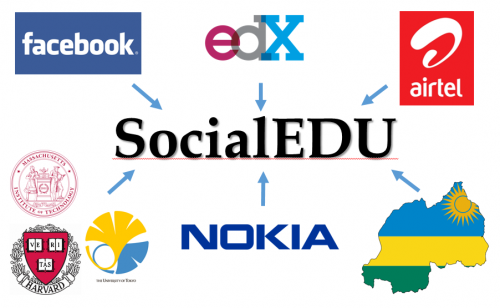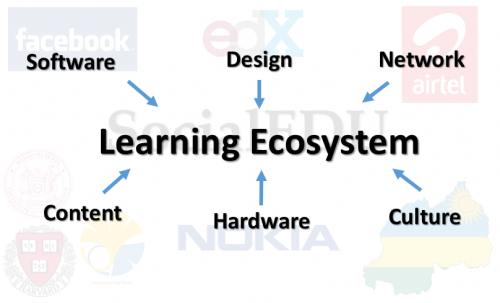What does facebook’s SocialEDU have to do with Organizational Learning?
Earlier today a co-worker brought an interesting article to my attention (linked at the bottom of this post). The article explores Internet.org, a collective formed by facebook and a number of mobile phone companies. Internet.org has a wide net of areas they are looking to impact; what I found interesting was SocialEDU, one of the first plans to come from from the collective, and the parallels that exist between SocialEDU and how organizational learning needs to be supported.
First, let’s look at SocialEDU. Here’s the description of the pilot program being rolled out in Rwanda:
Facebook will develop an educational app along with EdX, a massive open online course (MOOC) platform that will make course materials from institutions like Harvard, MIT and the University of Tokyo available for students in Rwanda. Nokia will lend support on the hardware side by providing “affordable” smartphones. Airtel, a local carrier, will provide free data for participating students for a year—though it remains unclear what subsidies, if any, will be offered after that. The Rwandan government, meanwhile, will provide financial aid for students purchasing smartphones and extend its free WiFi program to cover the country’s universities.
Here’s a graphic I created showing each of the individual components that are contributing to the infrastructure of Social EDU.
Let’s take a simplified look at what each contributor is bringing to SocialEDU.
- facebook: the technical expertise to develop a social app
- edX: the knowledge and skills to design an environment in which people can learn
- Airtel: the network
- Harvard, MIT, and University of Tokyo: The content for the courses
- Nokia: The phones
- Rwandan Government: Financing, access, and support
Is this really all that different than how organizational learning ecosystems should be built? Let’s take another look at that image.
Each category plays a critical role in the building of an organization’s learning ecosystem.
- Software (facebook): Much of today’s learning and performance support is built on technology. Software is what creates technology-based learning experiences, and how that software is obtained (developed in house, outsourced, off-the-shelf, etc.) impacts the learning ecosystem.
- Design (edX): Knowing how to develop software that can support learning is very different than knowing how to design an effective learning environment.
- Networks (Airtel): Where is the exchange of information taking place?
- Content (colleges): Content is always there; The challenge is in partnering with subject matter experts to help transform content into learning and performance support tools.
- Hardware (Nokia): Hardware is no longer a standard in a mobile-first world. Organizations must consider the hardware that is available to support learning and performance.
- Culture (Rwanda): Culture includes many factors that impact a learning ecosystem, such as the support provided by senior management, the freedom workers feel to share with one another, and more.
Each of these categories is important; removing any one of them could cause a learning ecosystem to collapse. There’s also a tremendous interdependence among the various components. As an example, an organization could have incredibly well designed and developed software running on cutting edge hardware, but if the culture does not support sharing, it’s ability to take advantage of social learning is going to be handcuffed. Effective learning ecosystems are well-balanced across all dependencies.
I think the approach taken by SocialEDU is representative of a growing awareness of the different factors that contribute to an individual’s ability to learn. It will be interesting to watch SocialEDU evolve, and to take lessons from it that we can use as we build learning ecosystems within our own organizations.
To learn more about learning ecosystems, and connect with other learning leaders exploring this expanded viewpoint on learning and performance, be sure to join us at Ecosystem 2014 next month in Orlando!
Related Article:
Facebook is Bringing MOOCs and facebook to Rwanda



Leave a Reply